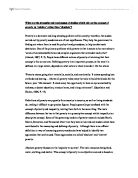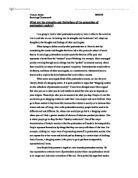The link between the lord and the serf can be said to arise from a variety of reasons. However, the governmental state in which this relationship became apparent is likely to have been an originating factor. Due to an ineffective central authority, a system developed whereby legal authority became diffused to local powers. This emphasised the role of the manorial system once again, whereby the landed gentry would rule precedence over their acquired lands. This decentralised authority became the basis for local government, which would also include local militaries, laws and rules, all of which would vary depending on locality, but can be seen as a defining feature of feudal societies. Linked to this notion of local government authority is the idea the fief, the vassal and military service.
Within the social hierarchy, it became customary for individual freemen, those who had no ties to land such as those in serfdom, to place themselves under the protection of a more powerful freeman, the lord. Once again, a relationship became apparent. By doing this, the lesser freeman was able to seek protection from others in times of war while the overlord or suzerain could use this relationship to suit his own ends. The man who entrusted himself to the lord became known as a vassal, and in repayment for his protection was required to perform military service in the lords private forces. The lord was obviously keen to increase his forces as this would enable him to become more a dominant figure within the local government as well as provide safety in uncertain times. It was however difficult to maintain growing armies as the vassals would expect payment for their service. What became customary was the practice of granting a benefice or fief. This entailed giving real property, usually in the form of land, to the vassals as payment. The vassal was then expected to live on the land and derive sustenance from it, also becoming a lord over the peasants who inhabited and worked the fields. The process of becoming a vassal and gaining a fief required firstly an act of homage, where by
‘Placing one’s joined hands between the hands of the lord, one became his man, his vassal.’
(Brown 1973 p29)
This act of homage was based around that of fealty. This involved the vassal swearing allegiance to the lord and vowing to perform the services and acts required of him. This procedure served to cement the bond between the vassal and the overlord, and in theory was to last as long as did the two parties. However, it soon became practice for the vassals’ eldest son to take the vow of fealty on his fathers’ death, and therefore the fief began to be seen as a hereditary rite.
In general, this process created a collective dependency, whereby each party would rely on the other for specific reasons or obligations. The vassal in particular owed a great deal to the lord, but in general, the obligations would either be in the form of military service or according to Herlihy (1970), financial aid. This financial aid would generally be required under three incidents. Namely, the knighting of the lords eldest son, the marriage of his eldest daughter and the ransoming of his own person when he was captured in war. It could also be required on any number of other occasions but this was generally open to discussion by all those involved.
This requirement by the vassal to provide military service leads to a further defining feature of feudal societies, specifically the knight and knighthood. The idea of the knight comes from the Latin word miles meaning soldier and identifies an armoured warrior mounted on horseback belonging to the nobility. The need and desire for large private armies meant that a permanent military class was being installed throughout society, so much so, that the knight was seen as an ‘essential component in feudal societies’ (- 1987). They can be seen as a form of military officer, and derive their place in society not only from belonging to the nobility but also from the ranks of landowners. This is the link between military services and knight service, whereby the land bequeathed to them entailed a period of military service, usually forty days a year, saw them as a knight of the lord. Although all members of the nobility were in theory knights, knighthood had to be earned. The apprentice knight was known as a squire and would complete his training under the leading of a master warrior. By following him into battle, it was expected that the squire might show a feat of arms, a ‘masterpiece of his profession’ (Herlihy 1970). This was seen as proof that he was prepared to enter the knighthood and became admitted under a process known as ‘dubbing’. This was bestowed by the overlord with an accolade, a blow, usually with the flat of the sword, on the neck or shoulder. This ‘warned the young the knight he should be ready to suffer hurt and harm in the service of chivalry’ (Herlihy 1970).
The concept of the knight in feudal society gave way to another defining feature, that of the castle. This was seen by Brown (1973) to be one of four defining features of feudal societies. In accordance to this, is the idea that the castle could have two key uses in society, a ‘dual role’, one of which was private, while the other was public. The castle can be seen as the fortified residence of a lord, usually used in times of war where a more secure holding was required. The castles would be in military strongholds or key locations within the lords’ territories, and would enable the military campaign to be run. In some cases, these castles were far from the concept of only occasional use in times of war. In some areas, there was a requirement for the continued presence of an active castle, so much so, that the fief given to the vassal would contain special requirements which ‘would make castle guard the essential part of the tenants obligation.’ (Stenton 1929, p192) The second usage for these castles would be on a more public level. They would be symbols of a lords’ military force, dominating the landscape and providing an emblem of the lords’ reign.
One further feature that can be said to be defining of this era was the church and religion. During this time the church came under great reforms. This took the structure of freeing the church from the domination of local leaders, and became known as the ‘Gregorian reform’ named after Pope Gregory VII. Alongside this, the reformists were keen to restrict warfare, which with the increased levels of pillaging had been so damaging to the church.
‘Violence was a major and recognised plague in Western society, and churches and churchmen were among its most frequent victims.’
(Herlihy 1970)
This notion of restricting warfare proved to be very difficult for the church to implement. However, the religious crusades from the 11th century onwards were actually very successful for the church. They had managed to change the image of the knight to suit their own ideals. This image now rested on the knights’ ability to discriminate between fighting for good and for evil, and to use his skills in a way to benefit society. Those knight who fought for religion,
‘Commit no evil but rather does good, for his people and himself. If he dies in the battle, he gains heaven; if he kills his opponent, he avenges Christ. Either way, God is pleased.’
(Herlihy 1970)
In conclusion, it is clear to see how the definition of feudalism or feudal societies can be fraught with misconceptions, irregularities and contradictions. However, even if the definition is a complex one, certain characteristics or features of these societies can be identified. There have been many writers on this subject and all seem to highlight the same distinctive features, such as the serf and lord, the fief, the vassal and the knight. It also seems to be the case that these features, even though separate and distinct do have some linking factor to another, or a way in which one feature can lead on to another. This can be seen in the case of the lord and the vassal, whereby the lord requires or wishes to obtain a private army so enlists the help of the vassal. The vassal on the other hand also requires the help of the lord for protection and so forth, so a relationship ensues. For the lord to build up the numbers of his armed forces, it is necessary for him to attract a great deal of vassals, all of which will require some form of payment. This can be seen by the giving of a fief or land in return for military service. This service links the vassal to the knight who is in turn linked to the castle and thus religion by the way of the crusades. All of these features have been identified as defining this epoch and all of them have one or more links to another.
However, with the rise of powerful monarchs in France, Spain, and especially in England, where the feudal system was abolished in 1661, and with the rise of towns and industrial production, the feudal way of life was in decline. This notion was further cemented with the emergence of new artisan and merchant social classes and thus, the decline of feudalism became ever more apparent. Yet, even with this decline and eradication of feudal society, relics are still visible today and still shape the way in which society develops.
Word Count: 2037
Bibliography
-
Brown, A. (1973) Origins of English Feudalism London: George Allen and Unwin ltd
-
Bloch, M. (19610 Feudal Society Vol.1 London: Routledge
-
Herlihy, D. (ed) (1970) The History of Feudalism London: Macmillan and Co Ltd
-
Morrison, K. (1995) Marx, Durkheim, Weber. London: Sage
-
Stenton, F. (1932) The First Century of English Feudalism 1066 – 1166 Oxford: Oxford
University Press
- West, F. J. (1975) ‘On the Ruins of Feudalism – Capitalism?’ In E. Kamenka, R. S. Neale (ed).
Feudalism, Capitalism and Beyond London: Edward Arnold Publishers ltd
-
- (1987) Market House Books Dictionary of British History, London: Market House Books Ltd







